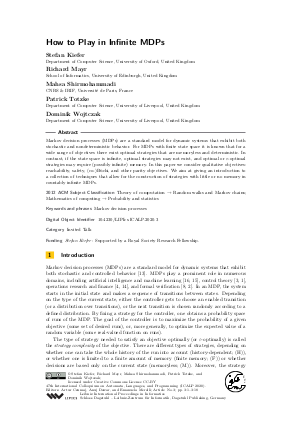How to Play in Infinite MDPs (Invited Talk)
Authors Stefan Kiefer, Richard Mayr, Mahsa Shirmohammadi, Patrick Totzke, Dominik Wojtczak
-
Part of:
Volume:
47th International Colloquium on Automata, Languages, and Programming (ICALP 2020)
Part of: Series: Leibniz International Proceedings in Informatics (LIPIcs)
Part of: Conference: International Colloquium on Automata, Languages, and Programming (ICALP) - License:
 Creative Commons Attribution 3.0 Unported license
Creative Commons Attribution 3.0 Unported license
- Publication Date: 2020-06-29
File

PDF
LIPIcs.ICALP.2020.3.pdf
- Filesize: 0.54 MB
- 18 pages
Document Identifiers
Subject Classification
ACM Subject Classification
- Theory of computation → Random walks and Markov chains
- Mathematics of computing → Probability and statistics
Keywords
- Markov decision processes
Metrics
- Access Statistics
-
Total Accesses (updated on a weekly basis)
0PDF Downloads0Metadata Views
Abstract
Markov decision processes (MDPs) are a standard model for dynamic systems that exhibit both stochastic and nondeterministic behavior. For MDPs with finite state space it is known that for a wide range of objectives there exist optimal strategies that are memoryless and deterministic. In contrast, if the state space is infinite, optimal strategies may not exist, and optimal or ε-optimal strategies may require (possibly infinite) memory. In this paper we consider qualitative objectives: reachability, safety, (co-)Büchi, and other parity objectives. We aim at giving an introduction to a collection of techniques that allow for the construction of strategies with little or no memory in countably infinite MDPs.
Cite As Get BibTex
Stefan Kiefer, Richard Mayr, Mahsa Shirmohammadi, Patrick Totzke, and Dominik Wojtczak. How to Play in Infinite MDPs (Invited Talk). In 47th International Colloquium on Automata, Languages, and Programming (ICALP 2020). Leibniz International Proceedings in Informatics (LIPIcs), Volume 168, pp. 3:1-3:18, Schloss Dagstuhl – Leibniz-Zentrum für Informatik (2020)
https://doi.org/10.4230/LIPIcs.ICALP.2020.3
BibTex
@InProceedings{kiefer_et_al:LIPIcs.ICALP.2020.3,
author = {Kiefer, Stefan and Mayr, Richard and Shirmohammadi, Mahsa and Totzke, Patrick and Wojtczak, Dominik},
title = {{How to Play in Infinite MDPs}},
booktitle = {47th International Colloquium on Automata, Languages, and Programming (ICALP 2020)},
pages = {3:1--3:18},
series = {Leibniz International Proceedings in Informatics (LIPIcs)},
ISBN = {978-3-95977-138-2},
ISSN = {1868-8969},
year = {2020},
volume = {168},
editor = {Czumaj, Artur and Dawar, Anuj and Merelli, Emanuela},
publisher = {Schloss Dagstuhl -- Leibniz-Zentrum f{\"u}r Informatik},
address = {Dagstuhl, Germany},
URL = {https://drops.dagstuhl.de/entities/document/10.4230/LIPIcs.ICALP.2020.3},
URN = {urn:nbn:de:0030-drops-124103},
doi = {10.4230/LIPIcs.ICALP.2020.3},
annote = {Keywords: Markov decision processes}
}
Author Details
Funding
- Kiefer, Stefan: Supported by a Royal Society Research Fellowship.
References
- P. Abbeel and A. Y. Ng. Learning first-order Markov models for control. In Advances in Neural Information Processing Systems 17, pages 1-8. MIT Press, 2004. URL: http://papers.nips.cc/paper/2569-learning-first-order-markov-models-for-control.
-
C. Baier and J.-P. Katoen. Principles of Model Checking. MIT Press, 2008.

-
V. D. Blondel and J. N. Tsitsiklis. A survey of computational complexity results in systems and control. Automatica, 36(9):1249-1274, 2000.

-
N. Bäuerle and U. Rieder. Markov Decision Processes with Applications to Finance. Springer-Verlag Berlin Heidelberg, 2011.

-
K. Chatterjee, L. de Alfaro, and T. Henzinger. Trading memory for randomness. In Annual Conference on Quantitative Evaluation of Systems, pages 206-217. IEEE Computer Society Press, 2004.

-
K. Chatterjee and T. Henzinger. A survey of stochastic ω-regular games. Journal of Computer and System Sciences, 78(2):394-413, 2012.

- K. Chatterjee, M. Jurdziński, and T. Henzinger. Quantitative stochastic parity games. In Annual ACM-SIAM Symposium on Discrete Algorithms, pages 121-130, Philadelphia, PA, USA, 2004. Society for Industrial and Applied Mathematics. URL: http://dl.acm.org/citation.cfm?id=982792.982808.
- E. M. Clarke, T. A. Henzinger, H. Veith, and R. Bloem, editors. Handbook of Model Checking. Springer, 2018. URL: https://doi.org/10.1007/978-3-319-10575-8.
-
W. Feller. An Introduction to Probability Theory and Its Applications, volume 1. Wiley & Sons, second edition, 1966.

- S. Kiefer, R. Mayr, M. Shirmohammadi, and P. Totzke. Büchi objectives in countable MDPs. In ICALP 2019, volume 132. LIPIcs, 2019. URL: https://doi.org/10.4230/LIPIcs.ICALP.2019.119.
-
S. Kiefer, R. Mayr, M. Shirmohammadi, and D. Wojtczak. Parity Objectives in Countable MDPs. In Annual IEEE Symposium on Logic in Computer Science, 2017.

-
D. Ornstein. On the existence of stationary optimal strategies. Proceedings of the American Mathematical Society, 20:563-569, 1969.

-
M. L. Puterman. Markov Decision Processes: Discrete Stochastic Dynamic Programming. John Wiley & Sons, Inc., New York, NY, USA, 1st edition, 1994.

-
M. Schäl. Markov decision processes in finance and dynamic options. In Handbook of Markov Decision Processes, pages 461-487. Springer, 2002.

-
O. Sigaud and O. Buffet. Markov Decision Processes in Artificial Intelligence. John Wiley & Sons, 2013.

-
R.S. Sutton and A.G Barto. Reinforcement Learning: An Introduction. Adaptive Computation and Machine Learning. MIT Press, 2018.

-
W. Zielonka. Perfect-information stochastic parity games. In Foundations of Software Science and Computation Structures, pages 499-513. Springer, 2004.

